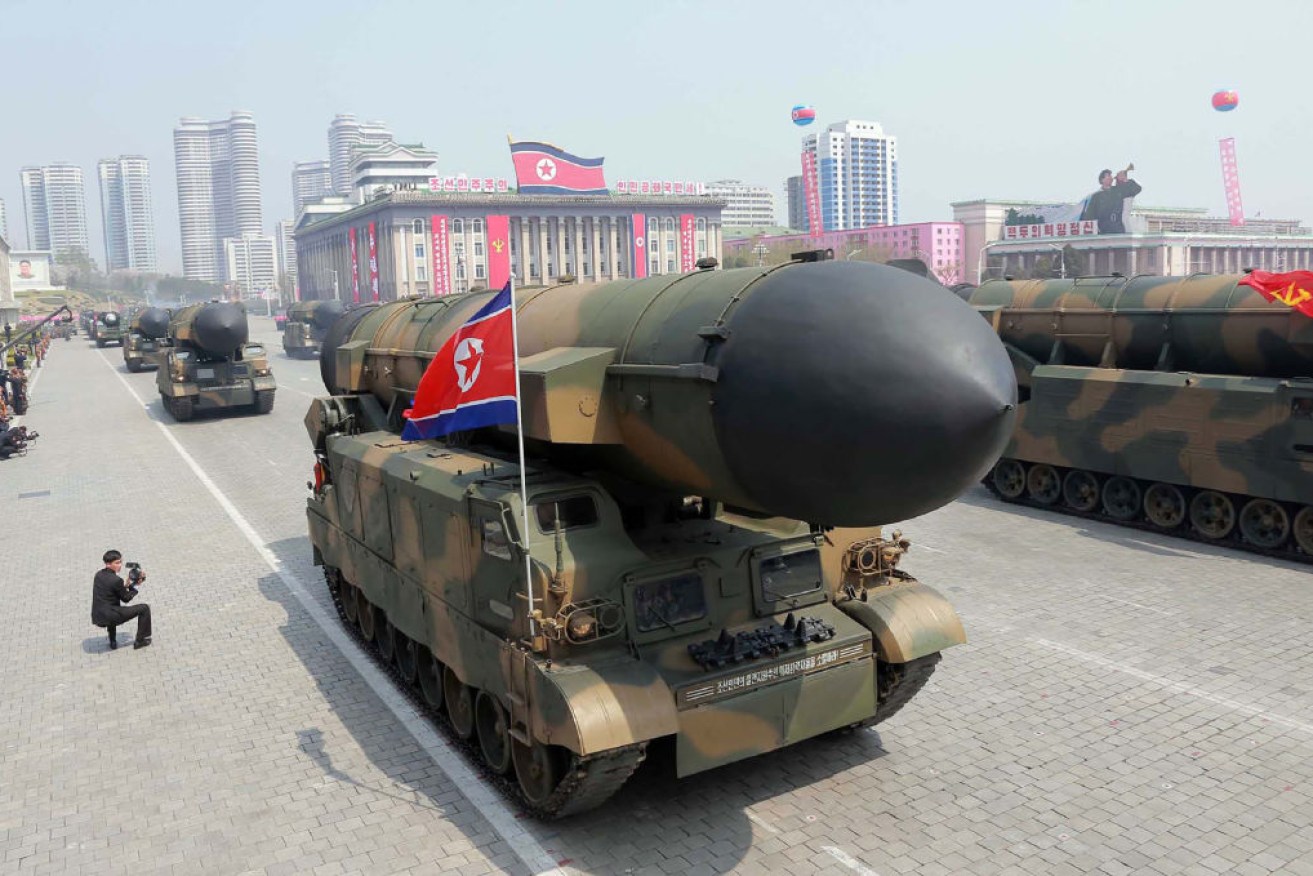US will ‘take action’ against North Korea, says security adviser

North Korean ballistic missiles being displayed through Kim Il-Sung square during a military parade in Pyongyang. Photo: Getty
UPDATE 2.15PM
North Korea’s failed missile launch may have been thwarted by US cyber sabotage, according to a former British foreign secretary.
Former Conservative Foreign Secretary Sir Malcolm Rifkind has raised the possibility in a BBC interview that the missile’s failure may not have been simply the result of a conventional malfunction, but of a US cyber attack.
“It could have failed because the system is not competent enough to make it work, but there is a very strong belief that the US — through cyber methods — has been successful on several occasions in interrupting these sorts of tests and making them fail,” Sir Malcolm said.
“But don’t get too excited by that, they’ve also had quite a lot of successful tests.
“They are an advanced country when it comes to their nuclear weapons programme. That still remains a fact — a hard fact.”
EARLIER
The United States, its allies and China are working together on a range of responses to North Korea’s latest failed ballistic missile test, US President Donald Trump’s national security adviser says.
“We are working together with our allies and partners and with the Chinese leadership to develop a range of options,” H.R. McMaster said on ABC’s This Week program on Sunday (US time).
“This latest missile test just fits into a pattern of provocative and destabilising and threatening behaviour on the part of the North Korean regime,” Mr McMaster said.
While But Mr McMaster stressed that the US wanted to resolve the matter “peacefully”, he also hinted that unannounced military action may also be considered by the US.
Speaking from Kabul, Afghanistan, Mr McMaster acknowledged the likelihood of North Korean retaliation if Washington uses military force in an attempt to stop its weapons programs, which complicated the US’s potential response, he said.
“What (is) particularly difficult about — about dealing with this regime, is that it is unpredictable,” he said.
“It’s clear that the President is determined not to allow this kind of capability to threaten the United States. And our President will take action that is in the best interest of the American people.”
Mr McMaster said Mr Trump had directed the National Security Council to collaborate with the Defense and State Departments, and intelligence agencies, to “provide options and have them ready for him if this pattern of destabilising behaviour continues.”
Hours after the failed test, Mr McMaster stressed Mr Trump’s preference, as with this month’s airstrikes in Syria, for unannounced military action.
He said the president had asked the national security council to integrate the efforts of the Defence and State departments and US intelligence agencies to develop options if “this pattern of behaviour continues and if the North Korean regime refuses to denuclearise.”
“There is an international consensus now, including the Chinese leadership, that this is a situation that just cannot continue,” Mr McMaster said.
The North Korean missile “blew up almost immediately” after its test launch on Sunday, the US Pacific Command said.
Hours later US Vice President Mike Pence landed in South Korea for talks on the North’s increasingly defiant arms program, a day after a military parade in Pyongyang included what appeared to be new long-range ballistic missiles.
North Korean leader Kim Jong Un has rebuffed admonitions from China and proceeded with nuclear and missile programs seen by Washington as a direct threat.
Mr Pence, addressing an Easter service with American troops in South Korea, said the US commitment to South Korea was unwavering.
The US nuclear-powered Carl Vinson aircraft carrier strike group is heading to the region.
China has spoken out against North Korea’s weapons tests and has supported UN sanctions. It has repeatedly called for talks while appearing increasingly frustrated with the North.
China banned imports of North Korean coal on February 26, cutting off its most important export.
Pyongyang has conducted missile and nuclear tests in defiance of UN sanctions, and regularly threatens to destroy South Korea and the US.








